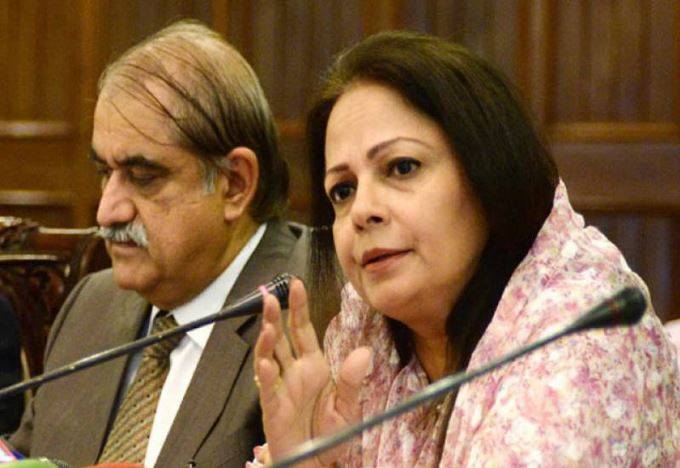Govt undertaking multiple reforms to boost economy: Dr. Ayesha
Shares

LAHORE, (APP): Provincial Finance Minister Dr. Ayesha Ghaus Pasha said the Punjab government was doing its best by allocating a huge amount to developmental projects.
Addressing an extension lecture session on National Macroeconomic Management and Role of Provinces organized by Punjab Economic Research Institute (PERI), Planning & Development Department at a local hotel, she added that acroeconomic policy tools were still in the realm of the federal government, while the provincial government was undertaking multiple reforms to boost the economy, a lot of assistance was still required from the center.
Dr. Ayesha Ghaus thanked Renowned Macroeconomist Pakistan, Dr. Waqar Masood Khan, for providing a comprehensive analysis of the roles of provincial and federal governments, besides highlighting challenges being faced by either government in the matters of policy-making. Consequently, she was hopeful that the center would continue to facilitate provincial governments in achieving an equitable social and economic prosperity in their respective provinces.
She said these advancements would be reflected in the key economic indicators of the country which was and should be the ultimate goal. She added that given the economic history of the country as presented today, important lessons needed to be learnt, the most vital being that growth needed to inclusive and broad based. Finance Minister was of the opinion that real sectors such as agriculture and industry were the drivers of sustained growth.
On this occasion, Punjab P&D Chairman Muhammad Jehanzeb Khan stated that macroeconomic management was one aspect wherein provincial and federal government needed to be in complete harmony. This was because policies with respect to interest rate, import-exports, import duty, and taxes (most prominently the sales tax) were being formulated at the center.
He was hopeful that this lecture would offer an insight into both the inter-provincial and the federal-provincial dynamics. He also expressed his concerns regarding how external factors caused economic volatility, as a result of which policies cease to remain effective.
He concluded by stressing on the fact that the provincial governments were here to complement the federal government. And that its main aim was to augment growth of the country by ensuring good governance in our province. He assured that the P&DD intended to continue to make the best use of the available resources in order to achieve targets of the Growth strategy and the Vision 2025.
At the lecture session, renowned macroeconomist Dr. Waqar Masood Khan presented the key findings of his paper on economic management. He described how various form of economic models adopted by different governments had fared. It was clearly explained as to how both nationalization and denationalization affected the economy. The economic affairs were analyzed in the context of different government tenures.
He highlighted the various achievements of these governments that helped place Pakistan on to the right track. These included: the new NFC Award, 18th Amendment, successful implementation of three-Year IMF programme, and CPEC. Nonetheless, the country has seen quite a few policy failures as well causing the growth to be the lowest, averaging less than three per cent in five years and inflation at an average of 12 percent (during Gilani-Ashraf government).
Apart from this, he discussed the importance of provincial governments in matters pertaining to education, health, water and sanitation, infrastructure, and other social sectors.
He was of the view that after the 18th Amendment the authority of provincial governments have increased substantially. Given this, he felt that the balance between federal and provincial needs as well as the mechanics of an efficient federation have been compromised. As according to him, without provincial consent and participation, economic reforms and fiscal adjustment would be impossible.
He concluded the lecture by emphasizing on the need for federal and provincial coordination and terming it as imperative both in setting the objectives and then achieving them.
Earlier, In his welcome address, Dr. Mumtaz Anwar Director PERI informed
the participants about the efforts being made by PERI in bringing together the academicians, practitioners and government officials and giving them an opportunity to share their experiences and insights that can help achieve economic well-being. PERI has played an instrumental role in providing socio-economic insight using evidence based research on national and provincial issues, he disclosed.
Secretary P&D Iftikhar Ali Sahoo, Economist Dr. Shujat Ali, Chairman Punjab Revenue Authority (PRA) Dr. Raheel Siddique, Director PERI Dr. Mumtaz Anwar, Secretary Mines & Minerals Dr. Muhammad Arshad, Members P&D Board, Dr. Shabana Haider, Malik Sadaqat, Additional Secretary P&D Dr. Shahid Adil, Development Sector Chief P&D, senior government officials, chairpersons of various universities, economists, academicians, journalists, and representatives from social organizations & industry sector attended the session.
